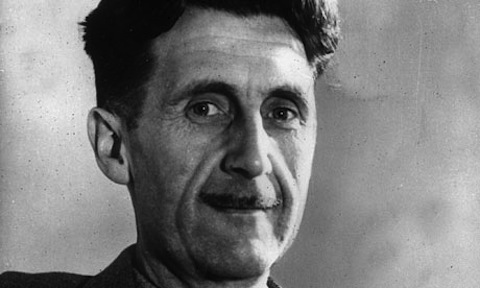
Every time I’ve taught George Orwell’s famous 1946 essay on misleading, smudgy writing, “Politics and the English Language,” to a group of undergraduates, we’ve delighted in pointing out the number of times Orwell violates his own rules—indulges some form of vague, “pretentious” diction, slips into unnecessary passive voice, etc. It’s a petty exercise, and Orwell himself provides an escape clause for his list of rules for writing clear English: “Break any of these rules sooner than say anything outright barbarous.” But it has made us all feel slightly better for having our writing crutches pushed out from under us.
Orwell’s essay, writes the L.A. Times’ Pulitzer-Prize winning columnist Michael Hiltzik, “stands as the finest deconstruction of slovenly writing since Mark Twain’s “Fenimore Cooper’s Literary Offenses.” Where Twain’s essay takes on a pretentious academic establishment that unthinkingly elevates bad writing, “Orwell makes the connection between degraded language and political deceit (at both ends of the political spectrum).” With this concise description, Hiltzik begins his list of Orwell’s five greatest essays, each one a bulwark against some form of empty political language, and the often brutal effects of its “pure wind.”
One specific example of the latter comes next on Hiltzak’s list (actually a series he has published over the month) in Orwell’s 1949 essay on Gandhi. The piece clearly names the abuses of the imperial British occupiers of India, even as it struggles against the canonization of Gandhi the man, concluding equivocally that “his character was extraordinarily a mixed one, but there was almost nothing in it that you can put your finger on and call bad.” Orwell is less ambivalent in Hiltzak’s third choice, the spiky 1946 defense of English comic writer P.G. Wodehouse, whose behavior after his capture during the Second World War understandably baffled and incensed the British public. The last two essays on the list, “You and the Atomic Bomb” from 1945 and the early “A Hanging,” published in 1931, round out Orwell’s pre- and post-war writing as a polemicist and clear-sighted political writer of conviction. Find all five essays free online at the links below. And find some of Orwell’s greatest works in our collection of Free eBooks.
1. “Politics and the English Language”
3. “In Defense of P.G. Wodehouse”
5. “A Hanging”
Related Content:
George Orwell’s 1984: Free eBook, Audio Book & Study Resources
The Only Known Footage of George Orwell (Circa 1921)
George Orwell and Douglas Adams Explain How to Make a Proper Cup of Tea
Josh Jones is a writer and musician based in Durham, NC. Follow him at @jdmagness


You can’t go wrong with Orwell, so I feel bad about complaining. But how is “Shooting an Elephant” not on here?!?!
YES. Totally agree!
And “Down and Out in Paris and London” is one of the best comments on homelessness EVER!
Good article. In this selection of essays, he ranges from reflections on his boyhood schooling and the profession of writing to his views on the Spanish Civil War and British imperialism. The pieces collected here include the relatively unfamiliar and the more celebrated, making it an ideal compilation for both new and dedicated readers of Orwell’s work.nnhttp://essay-writing-company-reviews.essayboards.com/
Very thought provoking
i am crudbutt
i am crudbutt!
I think Orwell would have been irritated at your use of how instead of why.